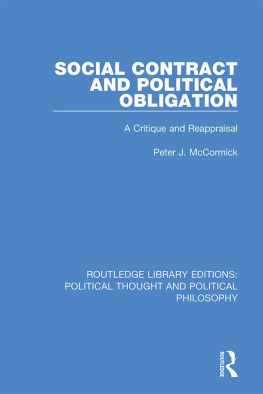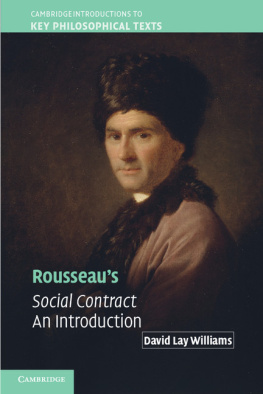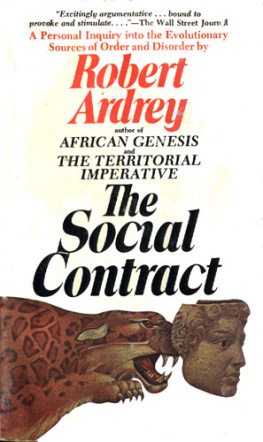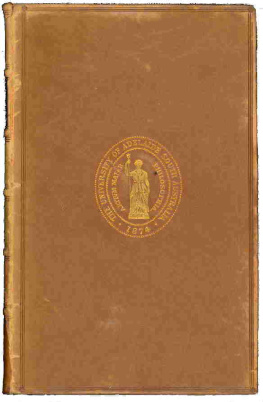ROUTLEDGE LIBRARY EDITIONS:
POLITICAL THOUGHT AND POLITICAL PHILOSOPHY
Volume 38
SOCIAL CONTRACT AND POLITICAL OBLIGATION
SOCIAL CONTRACT AND POLITICAL OBLIGATION
A Critique and Reappraisal
PETER J. MCCORMICK
First published in 1987 by Garland Publishing, Inc.
This edition first published in 2020
by Routledge
2 Park Square, Milton Park, Abingdon, Oxon OX14 4RN
and by Routledge
52 Vanderbilt Avenue, New York, NY 10017
Routledge is an imprint of the Taylor & Francis Group, an informa business
1987 Peter James McCormick
All rights reserved. No part of this book may be reprinted or reproduced or utilised in any form or by any electronic, mechanical, or other means, now known or hereafter invented, including photocopying and recording, or in any information storage or retrieval system, without permission in writing from the publishers.
Trademark notice: Product or corporate names may be trademarks or registered trademarks, and are used only for identification and explanation without intent to infringe.
British Library Cataloguing in Publication Data
A catalogue record for this book is available from the British Library
ISBN: 978-0-367-21961-1 (Set)
ISBN: 978-0-429-35434-2 (Set) (ebk)
ISBN: 978-0-367-23420-1 (Volume 38) (hbk)
ISBN: 978-0-429-27998-0 (Volume 38) (ebk)
Publishers Note
The publisher has gone to great lengths to ensure the quality of this reprint but points out that some imperfections in the original copies may be apparent.
Disclaimer
The publisher has made every effort to trace copyright holders and would welcome correspondence from those they have been unable to trace.
SOCIAL CONTRACT AND POLITICAL OBLIGATION
A Critique and Reappraisal
Peter J. McCormick
Copyright 1987 by Peter James McCormick
All rights reserved
Library of Congress Cataloging-in-Publication Data
McCormick, Peter James.
Social contract and political obligation.
(Political theory and political philosophy)
Originally presented as the authors thesis
(doctoral), London, 1974.
1. Political obligation. 2. Social contract.
I. Title. II. Series.
JC329.5.M28 1987 320.011 8627011
ISBN-0-8240-0825-1
All volumes in this series are printed
on acid-free, 250-year-life paper.
Printed in the United States of America
Table of Contents
The major subject matter with which this discussion will concern itself is political obligation, the question of the justification of obedience to law. The emphasis in such a phrase must be on the word justification; an enquiry into political obligation is not primarily concerned with the question of why people do or do not in fact obey, but must instead focus on why they should obey. Even the question of why people think they should obey, which so occupies, for example, Hume, is logically a separate question; it is transparently clear that in the case of at least two of the philosophers to be considered (namely Hobbes and Rousseau), their primary intention was to demonstrate how mistaken most people were on the subject.
More specifically, within the field of political obligation theory, the discussion will concern itself with social contract, the doctrine that holds that the only legitimate foundation for government is that it is founded on the consent of the governed. Because the problem of political obligation is one of justification rather than explanation, the aspect of social contract with which such a discussion is necessarily concerned deals not with the origins but with the justification of society; the distinction is so obvious that it should not have to be made, but such an understanding is often absent from treatments of the contractarians.
Of course, the subject of obligation and social contract is hardly one of the unexplored regions of political philosophy; it is generally assumed to have been explored so thoroughly that social contract can be dismissed quite briefly and condescendingly from accounts of political obligation. Even such attempts as are made to resurrect the model for example, that of John Rawls seem not repudiate but to underline such facile rejections, in that they merely repeat in slightly more sophisticated form the arguments and blunders of earlier thinkers. It is sometimes charitably granted that contract thought contains the general and laudable theme of government as possessing only limited powers in trust; beyond this, the contractarian position is quickly shattered and its remnants swept into democratic theory (especially when the question of pedigree enters the debate on democracy).
David Hume, Of the Original Contract, from David Humes Political Essays, ed. by C.W. Hendel (New York: Bobbs-Merrill Library of Liberal Arts, 1953)
cf. Chapter 6
However, this discussion has a purpose other than rehashing the oft-repeated refutations of contract theory as a viable basis for political obligation. It is entitled a critique, but the critique is not of social contract theory as such. Rather, it is the orthodox treatment of contract, the treatment that yields so easily to the rough handling that contract generally receives, which will be subjected to a critical analysis and rejected as inadequate. In its place will be suggested a reinterpretation of contract that sees it making rather different assumptions and requiring rather different premises, with the obvious result that it is proof against many, if not all, of the refutations of social contract theory. The reinterpretation is thus in itself something of a vindication of contractarianism.
The procedure for this treatment will be simple and direct. First, the most commonly cited champions of contractarianism will be examined, and from this examination will be derived a reinterpretation of contract in the form of a new model or syllogism. Next, the features of the new model of contract will be brought out by contrasting it first with the ideas of John Rawls and then with the orthodox model. Then democratic consent theory, as the heir to the remnants of the orthodox model, will be examined for its adequacy; after which the theories of T.H. Green will be considered as including an important feature of contractarianism omitted or ignored by the orthodox model (and hence by democratic theory). Finally, it will be attempted to apply the new model of contract as a potentially useful approach to the problem of political obligation in the modern context, and this in a way much more extensive and significant than general platitudes about fiduciary powers.
It should be specified in advance, to prevent misunderstanding, that a number of simplifying assumptions will be made; they are being made not because they are in any sense true, but because they facilitate discussion, prevent clumsy repetition, and avoid profitless or irrelevant bypaths.
First, the terminology of the discussion throughout will be that of command theory. This is not because the command theory is in any final sense satisfactory in places, sharp criticisms will be made in passing of the command theory but much of the language of political obligation (including even the basic question, Why should I obey the law?) seems to have command theory assumptions built right into it, and it would be both clumsy and distracting (and, for present purposes, quite unnecessary) to attempt to evolve a new vocabulary that would avoid such implications.












